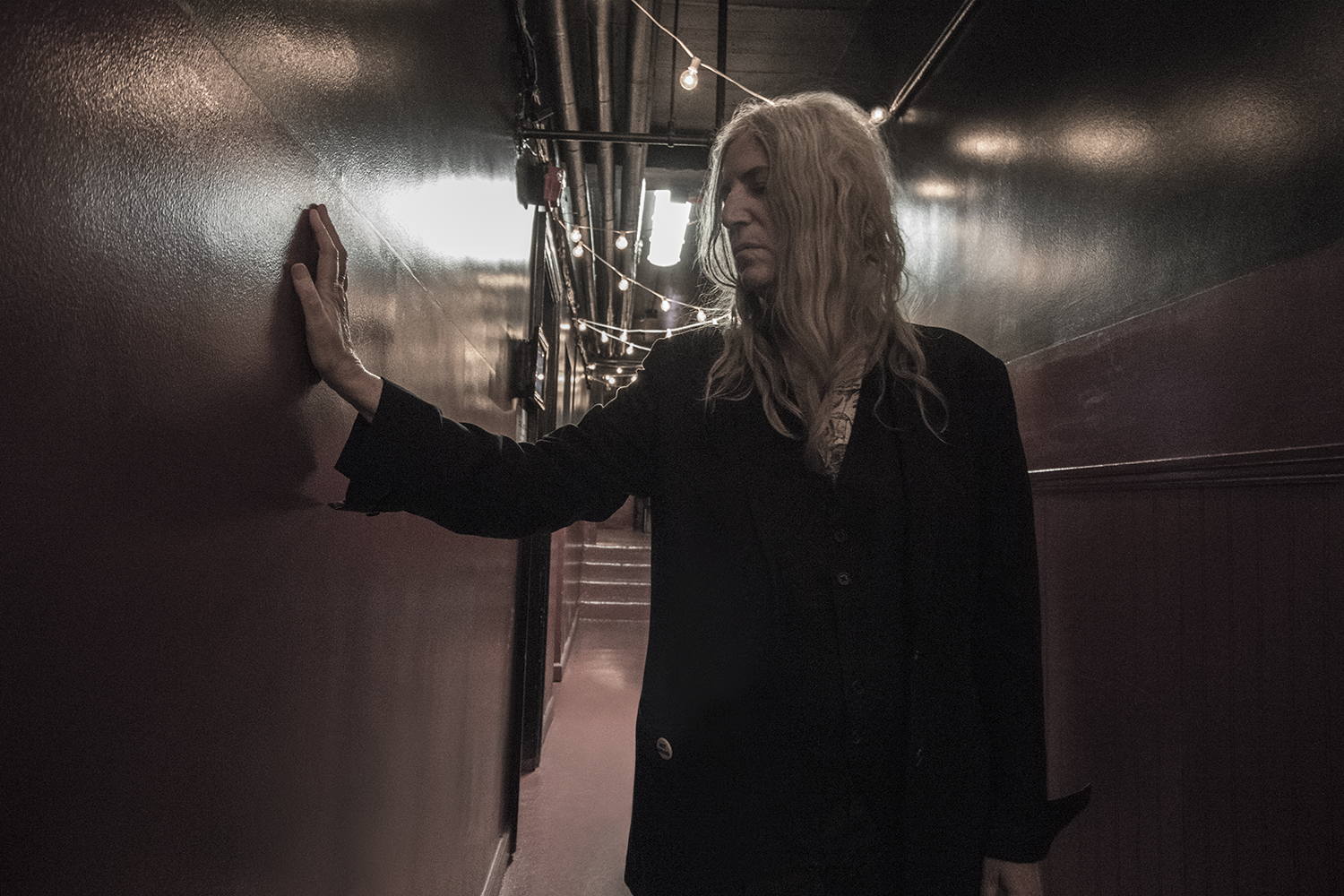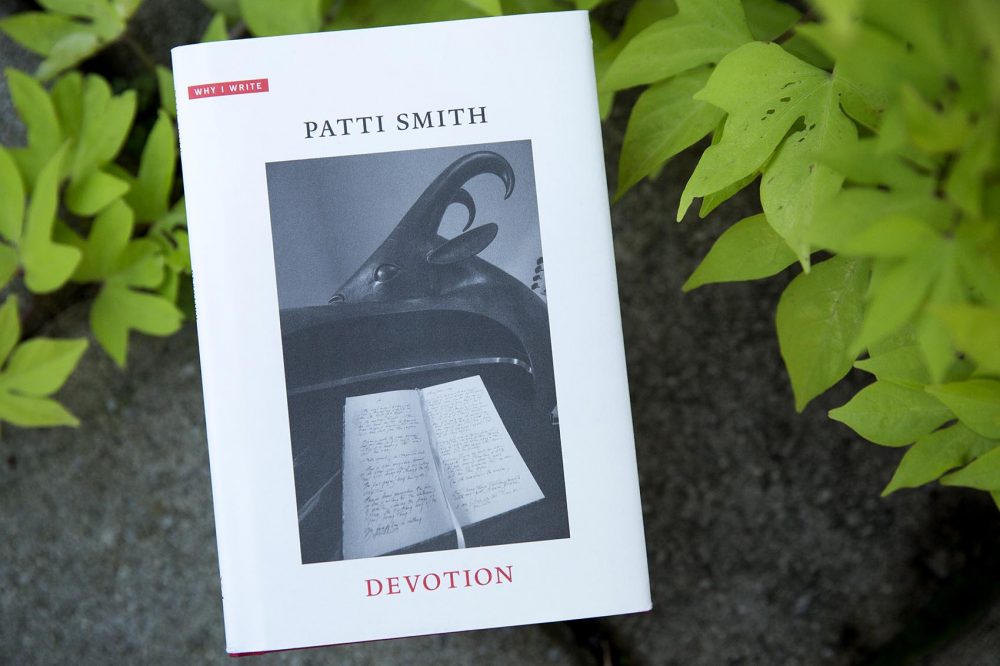Advertisement
Patti Smith Explores A ‘Devotion’ To Creative Invention

Nearly 30 years ago, I was in a Detroit hotel room talking with Patti Smith as she was preparing to come back to the rock ‘n’ roll world after nine years away from the fray.
She was confident about relaunching, but asked this of herself: "The only thing I've ever wrestled with through the years, in terms of art was, 'Am I good enough? Do I deserve to call myself an artist?' Or when I've had brief periods of the muse taking an extra-long vacation and you wonder, 'Did it go to Zanzibar and is it in some weird hotel, never coming back?' "
It came back then, and it’s still with her now. She’s still rocking, still writing and still reading from her work. Smith, now 70, has penned more than 10 books of poetry and prose, and will be reading from and discussing her latest, “Devotion,” at Back Bay Events Center in Boston on Thursday, Sept. 28 at 7:30 p.m. It’s sponsored by Harvard Book Store. (Your $30 ticket includes a copy of the book, but Smith will not be signing them.)
"The only thing I've ever wrestled with through the years, in terms of art was, 'Am I good enough? Do I deserve to call myself an artist?' "
Patti Smith
Smith — whom you will almost never not see referred to as the “godmother of punk rock” — has recast herself in recent years as someone who’s more likely to show up on The New York Times best-seller list than at the top of the Billboard charts. She began that way, as a poet, as a rock critic for Creem magazine, as a lyricist for early Blue Oyster Cult.
Twenty years ago, I was talking to Smith again about the writing process, be it via music, prose or poetry. "I start [writing] to see what will be revealed,” she said. “In a way, I've been dealing with the same theme since I was a kid, and that's communication with whatever's out there, be it God or whatever energy force or heightened body of knowledge is out there."
Her 2010 memoir, “Just Kids,” penned about her longtime friendship with the late photographer Robert Mapplethorpe, won the National Book Award for nonfiction.
Then “M Train,” published in 2015, was both memoir and travelogue with Smith visiting various cafés and haunts throughout the world, and reaching back for memories about her life with her late husband Fred “Sonic” Smith and other stories those travels inspired.
“Devotion,” a slender volume just over 100 pages, has three parts: The first, “How the Mind Works,” finds Smith again traveling, exploring the minds, workspaces and gravesites of writers she’s long admired (among them, Roberto Bolaño, Jean Genet, Arthur Rimbaud and Simone Weil) and is not unlike “M Train” in that aspect. She drops literary names and places as well as clues, rendering observations in her travels that will soon serve as kernels of inspiration for the short story to follow.
Smith winds her way in and out of coffee shops and cemeteries, inside of her dreams and outside in a waking, more analytical state pondering the “strange remorse I felt following the writing … I wondered, since I had birthed my characters, if I was mourning them,” and then concludes, “You wrote it … you can’t wash your hands of it like Pilate.”

That leads us into the main part of the book, called “Devotion” (the same as the book’s title), concerning the love-and-loss filled journey of Eugenia, a lonely teenage Russian orphan who is also a brilliant ice skater. The story is both minimalistic and engrossing, a character study that morphs into something darker. I did smile when I realized that in the opening section it took Smith only 20 pages to get to her favorite poet, Rimbaud. And surely enough, in the short story, Alexander — a mysterious, Svengali-like character who befriends Eugenia, renaming her “Philadelphia” (because it implied “freedom”) — also “found solace in the poet Rimbaud.”
How did Eugenia’s character come to Smith? In “How the Mind Works,” Smith writes that she was in a Paris hotel watching a figure skating championship on TV, noting a “sturdy blonde … 16-year-old Russian …. girl steps onto the ice as if nothing else exists. Her single-minded purpose, combination of innocent arrogance, awkward grace, and daring is breathtaking.”
Smith creates passages that encourage you to step back and consider her characters and their seemingly oblique motivations, but she can also turn a simple phrase that rings true, such as this: “Some things melt before they become memories.” And in describing Eugenia’s appearance as the one love of her life turns sour: “She possessed not the glow of love, but the face of a ravaged bird.”
The third segment, “A Dream Is Not a Dream,” is a postscript, a reflection on what Smith has been doing all her life that begins with the question, “Why is one compelled to write?”
"What is the dream? To write something fine, that would be better than I am, and that would justify my trials and indiscretions."
Patti Smith
Her answer: “What is the task? To compose a work that communicates on several levels, as a parable, devoid of the stain of cleverness. What is the dream? To write something fine, that would be better than I am, and that would justify my trials and indiscretions. To offer proof, through a scramble of words, that God exists.”
“Devotion” is drawn from a talk Smith gave last year for the Windham-Campbell Lecture at Yale.
“The book evolved a great deal from the original speech,” says John Donatich, director of Yale University Press. “Each section of the book was addressed in some form at the lecture; the book is obviously much longer and very different from what was spoken that night, although all of it is based there. ‘Devotion’ is an expanded version of that lecture.”
"Devotion" is the first of a “Why I Write” series published by Yale University Press. Norwegian novelist Karl Ove Knausgård gave a speech earlier this month and Yale will publish his book next year.
Smith is still, of course, a rocker. She last played Boston with her full band on New Year’s Eve at the Hynes Convention Center as 2013 became 2014. But earlier this month, she played Central Park SummerStage in New York, and on Nov. 5, she’s at Carnegie Hall. For the SummerStage gig, her children, guitarist Jackson Smith and keyboardist Jesse Paris Smith augmented her regular band. She dedicated a two-song medley to the late Hüsker Dü drummer-singer-songwriter Grant Hart, and closed the set with “People Have the Power,” joined by her longtime friend, former R.E.M. singer Michael Stipe.
I remember asking her back in 1988 about that newly released single. It had “anthem” written all over it, but it seemed to me impossibly optimistic, coming as it did at the end of the Reagan era and (we would soon realize) the dawn of the George H.W. Bush presidency.
"I'm well aware of the overly positive aspects of 'People Have the Power,' " Smith said. "Call it naive. I don't think being filled with hope and still having the desire and care and vision to dream is naive. The song is trying to give a little inspiration and hope in very troubled times. I don't see the point of just spewing negativity. If I wanted to put covers over my head, I would have never wed and had two children. If I'd wanted to put the covers over my head, I would have found some opium den and gone out in Cocteau-style."
While she’s expanded her audience into the literary crowd over the past few years, Smith’s core fans are still rockers.
So, what kind of power does Smith have in concert?
Here’s what I thought (and some of which I wrote for the Globe) two decades ago after seeing Smith perform at Boston's Avalon club (which was where the House of Blues is now): You can take your Mariahs, your Whitneys and your Celines. Smith, whose vocal range is far more limited, is the real deal — what rock 'n' roll should be about. There is just so much emotion, passion and poetry in her act, it's breathtaking. If Bob Dylan has a distaff sibling, it's Smith.
Smith was there at the beginning of punk rock — she put the poetry into punk. When I saw her in 1997, she was making little forays into the world of performance to support her "Peace and Noise" album, the Patti Smith Group created a magical world onstage. There was blues, country, folk, punk rock, garage rock — all of it melded together. Smith's music tends to come at you in waves, some gentle, some tidal.
One of the things that make Smith's music so special is that she's an A-level lyricist who understands that getting lost in, or transported by the music is what matters. When she and her guys sang the redemptive refrain, "We shall live again" in “Ghost Dance,” it was thoroughly convincing.
At the close of that show twenty years ago, she launched into "People Have the Power," a power-of-positive-thinking song that once made me wince. Not anymore. Smith's a believer. She can make you believe.
“Devotion” doesn’t have the multi-tiered oomph of a Smith concert — it can’t. Reading is a solitary pursuit; a concert can be about communal bonding. But in “Devotion,” Smith draws you in and brings you along a girl’s journey out of solitude and into something both empowering and dangerous. You’ll want to reread the first section to see what clues you missed about the thought-gathering process and when you come to the end, you’ll find a conclusion that’s hard to argue.
“Why do we write? A chorus erupts. Because we cannot simply live.”
Correction: Smith did not receive the Windham-Campbell Prize, but she was a keynote speaker at the award ceremony. We regret the error.
Patti Smith will be at Back Bay Events Center in Boston on Thursday, Sept. 28 at 7:30 p.m. talking about "Devotion." It’s sponsored by Harvard Book Store.
This article was originally published on September 25, 2017.




